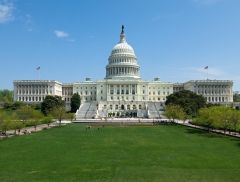 Representatives Waxman, Lee, DeLauro, Schakowsky, and Bass have sent a letter to Acting U.S. Trade Representative Demetrios Marantis supporting a proposal by Haiti to allow poor countries extra time to enact stronger rules on patent, copyrights, and other forms of intellectual property.
Representatives Waxman, Lee, DeLauro, Schakowsky, and Bass have sent a letter to Acting U.S. Trade Representative Demetrios Marantis supporting a proposal by Haiti to allow poor countries extra time to enact stronger rules on patent, copyrights, and other forms of intellectual property.
The issue involves the implementation of the World Trade Organization (WTO) Agreement on Trade Related Aspects of Intellectual Property Rights (TRIPS), which requires countries to adopt certain intellectual property standards. For instance, the TRIPS Agreement requires 20 year patents on all inventions (including medicines) and long copyrights on most works (including textbooks). TRIPS rules give IP owners the ability to set monopoly prices for goods, which can be unaffordable for many, especially in poor countries. Therefore, Least Developed Countries (LDCs) were granted extra time to implement TRIPS when the WTO was established, and this transition period was subsequently extended.
Haiti has formally requested a further extension of the transition period under Article 66 of the TRIPS Agreement. This Article guarantees that the WTO “shall” grant a further extension “upon duly motivated request by a least-developed country.” The request by Haiti specifically calls for the extension to apply to each LDC member of the World Trade Organization “for as long as the WTO Member remains a least developed country.”
The letter from Reps. Waxman, Lee, DeLauro, Schakowsky, and Bass urges the Obama Administration to consider Haiti’s request. The Representatives note that countries designated as LDCs by the UN are extremely poor (having a GNI per capita of less than $1,190) and “bear extreme health burdens.” The letter states:
“We are concerned that if LDC’s are required to fully implement TRIPS while still ‘least developed,’ this could limit access to quality, affordable medicines to fight HIV, malaria and other diseases; educational and informational resources; and agricultural goods and green technology. The Haiti proposal does not in any way prevent countries from implementing the elements of the TRIPS intellectual property rules if desired, but the application would give LDCs the flexibility to structure intellectual property rules to support development … we ask you to consider the LDC proposal and support a policy to extend the LDC waiver for implementing WTO intellectual property rules.”
Civil Society Concerns Over the Current U.S. Position
The Haitian proposal has support from many low- and middle-income countries. Hundreds of civil society groups have indicated their support.
However, civil society groups around the world have raised alarm that the U.S. and other developed countries have been fighting the proposal. An open letter from LDC Watch and the OWINFS Network note that countries supporting the extension have been left out of closed-door informal consultations. Moses Mulumba of the Center for Health, Human Rights & Development in Uganda is quoted in scidev.net saying that “The situation is quite alarming… If the exception is not provided, we would not be able to import [patent-protected drugs]. All our efforts on the ground will be affected.” Sangeeta Shashikant from the Third World Network told scidev.net that “This has become a battle of development versus compliance. The EU and US see this as a compliance issue.”
Matt Kavanagh from the Global Health Access Project describes what the developed countries have been pushing for in the negotiations: “The United States, European Union, and Australia are pushing hard to keep in place the “no roll-back” provision that prevents LDCs from changing their existing laws… They’re pushing for a very limited timeframe, one that is too short for any serious development to take place. And they’re pushing even further, by insisting that LDCs must start immediately to implement TRIPS. ”
The current transitional period for LDC compliance expires this July.




